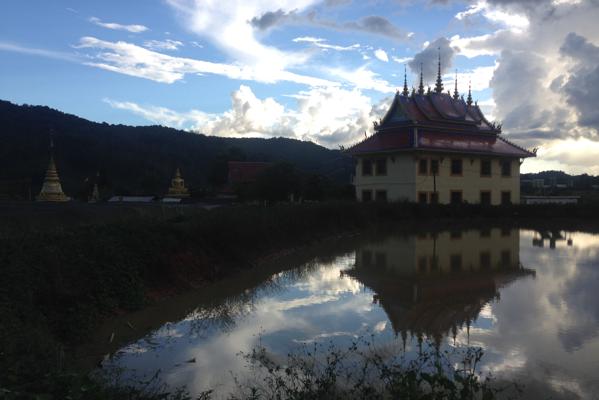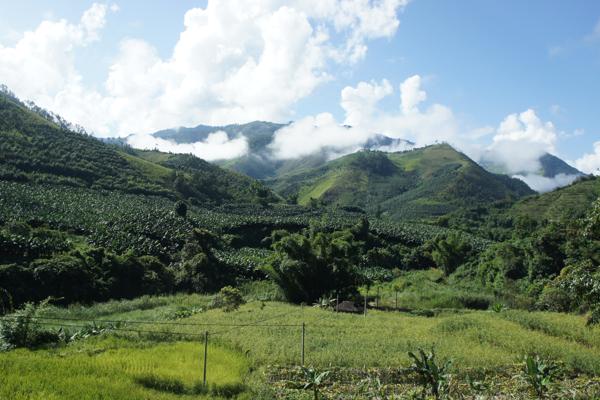
A Buddhist monastery in Xishuangbanna, Yunnan province.[Photo/China Daily]
Xishuangbanna has some of China’s most stunning scenery. Belle Taylor travels by bicycle to some of the most remote locations.
For most of the journey, I am so far behind everyone else that I am alone.
Just me, my bike and the rolling tea plantations of Southwest China’s Yunnan province, offering up spectacular vistas at every turn.
The view from the bike is idyllic, the situation on the bike less so. The southern part of Yunnan is hilly-much more than I had anticipated. I pant up the hills with every muscle screaming. The temperature is hitting the mid-30s and sweat drips into my eyes. What sort of person embarks on a 400-kilometer bike trip in southern Yunnan with no training? I wonder as I struggle up another hill. But as soon as I reach the top the reward is worth the pain-lush, green rolling hills, blue skies, powder-white clouds and a gentle breeze. In the distance I can see the golden roof of a pagoda and a farmer working the fields. It is breathtakingly beautiful.

The stunning scenery of Xishuangbanna. [Photo/China Daily]
The area I am cycling through is Xishuangbanna, the southern part of Yunnan province. While my ride often solo journey, cycling a few clips ahead of me is the rest of the tour group, organized by The Hutong, a cultural center based in Beijing. The annual trip takes in some of the most remote parts of Yunnan, and we cycle into towns that have only been accessible by road for a matter of months. We spend one night in a five-star hotel, another in a guesthouse, but most of the time we are the grateful guests of the local villagers who generously open their homes to a group of sweaty cyclists. We sleep next to each other in a line on the floor, usually in wooden houses, typical of the area. The houses are built on raised wooden stilts with the family’s animals living underneath. In one house we get a fitful sleep as an antsy pig keeps rolling up against a pillar beneath us, making the entire house rock on its foundations.
The area we are traveling was once part of the ancient tea road-and not much has changed since those caravans of traders passed through.
Tea is the main crop in this area, as it has been for centuries. We pass many kilometers of tea crops. Less romantic, but no less important to the area is rubber. There are forests of rubber trees, hoses sticking out of them from which rubber runs out as if on tap.
Myanmar is just over the border, and Buddhism is practiced widely in many of the towns we visit. We visit a picturesque monastery where young men, many of whom have traveled from over the border to study Buddhism.
The tour has attracted a mixed bunch of cyclists, from a young American family to a smattering of super-fit Germans to my own mother, who has traveled from Australia. Our guides are Chinese and American, but our guiding light is Wendy, a local to the area who speaks Mandarin and the regional dialect in this part of Yunnan.
Wendy knows Xishuangbanna like the back of her hand, and it is thanks to her local knowledge that we are welcomed into these remote villages, where Wendy has a network of friends and relatives. In one rest stop a young woman pours us tea before breaking into song, her beautiful voice sending tingles up our spines. Because many of the towns do not have a hotel-let alone a restaurant-we are usually fed in the home of a local. In one of the smallest towns where we stay, we are served dinner in the home of the local mayor. He presents us with a wide spread of Yunnan-style food-it is delicious, but we are really impressed when he modestly admits he has cooked it all single-handedly-on a lone wok in the corner of his home.
On the last night of the trip, we stay in the house of the town mayor, a wealthy man with a newly built, modern home. For dinner we move to his former house-in the backyard, a wooden house on stilts much like the places we have been staying in.
Two young girls from the local village arrive: They look like high school students. They are wearing tracksuits and giggle at us behind shy smiles, but when they start to sing their powerfully beautiful voices leave us all speechless. We do rounds of toasts with baijiu (white spirit), and start sharing songs and poems from our own countries. We dance around the room with our hosts. The room turns smoky, we are loud and a little drunk and filled with the beauty of all the things we have seen. And suddenly all the aches and pains and hills and dust are gone, and all I can think of is the beauty of Yunnan.
About this series
China Daily explores Silk Road destinations every Monday.
